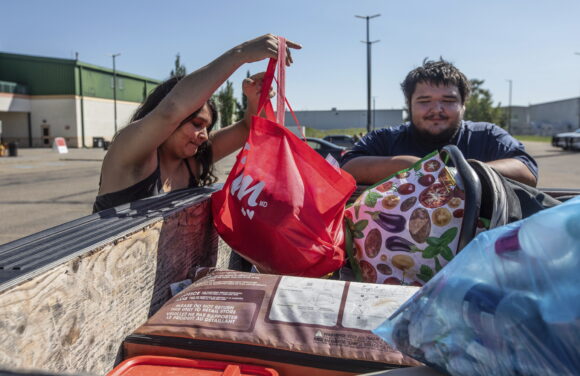YELLOWKNIFE, Northwest Territories (AP) — Residents of the capital of Canada`s Northwest Territories began fleeing an approaching wildfire Thursday in long convoys while air evacuations were underway for those who could not leave by road, the latest chapter in Canada`s worst fire season on record.
The fire was within 16 kilometers (10 miles) of the northern edge of Yellowknife, and people in the four areas of the city of 20,000 at highest risk were told to leave as soon as possible, Fire Information Officer Mike Westwick said.
Residents in other areas should be out by noon Friday, because strong north winds could push the fire toward the highway needed for evacuation, Westwick said. Although some rain was forecast for the region, first responders were taking no chances.
“I want to be clear that the city is not in immediate danger and there’s a safe window for residents to leave the city by road and by air,” Shane Thompson, a government minister for the Territories, told a news conference. “Without rain, it is possible it will reach the city outskirts by the weekend.”
Authorities said the intensive care unit at a Yellowknife hospital would close within 24 hours as the Northwest Territories health authority starts to reduce its services, the Health and Social Services Authority said on its website.
It said in-patient units from Stanton Territorial Hospital would be moved in the coming days, if required, and that most long-term care patients had been transferred to institutions to the south.
Prime Minister Justin Trudeau was expected to convene an urgent meeting with ministers and senior officials Thursday to discuss the evacuation.
Canada has seen a record number of wildfires this year — contributing to choking smoke in parts of the U.S — with more than 5,700 fires burning more than 137, 000 square kilometers (53,000 square miles), according to the Canadian Interagency Forest Fire Centre. As of Thursday, 1,053 wildfires were burning across the country, more than half of them out of control.
In the Northwest Territories alone, 268 wildfires have already burned more than 21,000 square kilometers (8,100 square miles).
Officials said evacuations from the Northwest Territories have so far been safe and orderly, and that evacuees from the capital who can’t find their own accommodations can get support in three centers in the nearby province of Alberta that were expected to open by noon Thursday. The closest of those centers is more than 1,000 kilometers (620 miles) by road from Yellowknife.
Only those without the option of leaving by road should register for the evacuation flights, officials added. People who are immunocompromised or have a condition that puts them at higher risk also were encouraged to sign up.
“We’re all tired of the word unprecedented, yet there is no other way to describe this situation in the Northwest Territories,” Premier Caroline Cochrane posted on X, formerly known as Twitter. She urged residents to obey emergency management officials, traffic control devices and posted speed limits. “The country is watching, and our neighbours are keeping us in their thoughts and prayers.”
The evacuation order issued Wednesday night applies to the city of Yellowknife and the neighboring First Nations communities of Ndilo and Dettah. Eight communities totaling nearly 6,800 people, or 15% of the Northwest Territories’ population, have already left, Mike Westwick, the region’s fire information officer, said earlier in the day.
The U.S. has also seen devastating wildfires, including one on the Hawaiian island of Maui, which killed more than 100 people and destroyed a historic town.
Rural areas near California’s border with Oregon were placed under evacuation orders Wednesday after gusty winds from a thunderstorm sent a lightning-sparked wildfire racing through national forest lands, authorities said.
Top photo: Hay River, N.W.T. fire evacuees Tanisha Edison and her boyfriend Mason Bruneau go through their belongings at the evacuee centre in St. Albert, Alta. on Wednesday, Aug. 16, 2023. (Jason Franson /The Canadian Press via AP)
Was this article valuable?
Here are more articles you may enjoy.


 Tesla’s Austin Robotaxis Report 14 Crashes in First Eight Months
Tesla’s Austin Robotaxis Report 14 Crashes in First Eight Months  Judge Upholds $243M Verdict Against Tesla Over Fatal Autopilot Crash
Judge Upholds $243M Verdict Against Tesla Over Fatal Autopilot Crash  Red Flags Adjusters Should Look for in Truck Accident Claims Investigations
Red Flags Adjusters Should Look for in Truck Accident Claims Investigations  AI Got Beat by Traditional Models in Forecasting NYC’s Blizzard
AI Got Beat by Traditional Models in Forecasting NYC’s Blizzard 